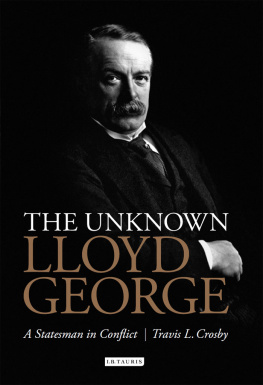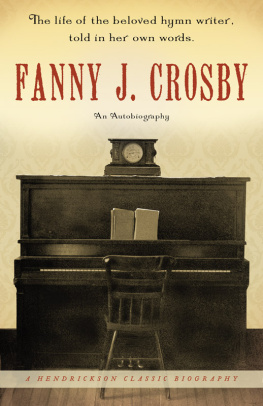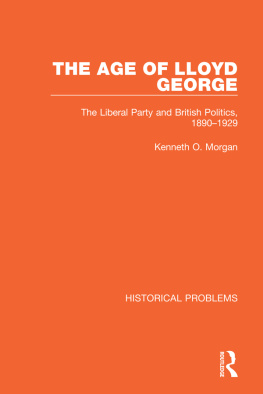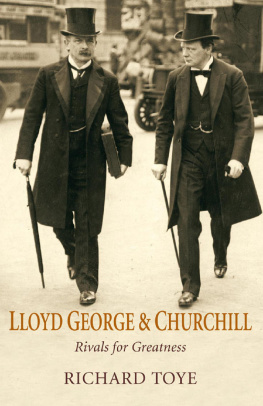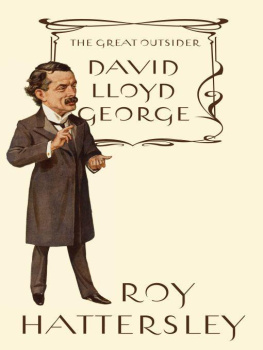Travis L. Crosby is Emeritus Professor of History at Wheaton College, Massachusetts. His publications include Joseph Chamberlain: A Most Radical Imperialist (I.B.Tauris), The Two Mr. Gladstones and Sir Robert Peels Administration.

Published in 2014 by I.B.Tauris & Co Ltd
6 Salem Road, London W2 4BU
175 Fifth Avenue, New York, NY 10010
www.ibtauris.com
Distributed the United States of America and Canada Exclusively by Palgrave Macmillan
175 Fifth Avenue, New York, NY 10010
Copyright Travis L. Crosby, 2014.
The right of Travis L. Crosby to be identified as the author of this work has been asserted by him in accordance with the Copyright, Designs and Patents Act 1988.
All rights reserved. Except for brief quotations in a review, this book, or any part thereof, may not be reproduced, stored in, or introduced into a retrieval system, or transmitted, in any form, or by any means, electronic, mechanical, photocopying, recording or otherwise, without the prior permission of the publisher.
References to websites (URLs) were accurate at the time of writing.
Every attempt has been made to gain permission for the use of the images in this book. Any omissions will be rectified in future editions.
ISBN: 978 1 78076 485 6
eISBN: 978 0 85773 648 2
A full CIP record for this book is available from the British Library
A full CIP record for this book is available from the Library of Congress
Library of Congress Catalog Number available
LIST OF PLATES
Early portrait of an ambitious politician, 1898 ( National Portrait Gallery, London)
At his ease as a young parliamentarian in 1905 (photo by Ernest H. Mills/Getty Images)
The young family in November 1910
A dashing Lloyd George as portrayed by Will Dyson in the Daily Herald, October 1912
Riding to the rescue as Chancellor of the Exchequer, but soon to be Minister of Munitions of War
The Council of Four at the Paris Peace Conference, January 1919
In October 1919, a triumphant Prime Minister addresses a crowd from Mansion House in the City of London (photo by Hulton Archive/Getty Images)
On the high wire in 1926
Lloyd George advocates his land scheme at Kingsway Hall in November 1926 (photo by Fox Photos/Getty Images)
Lloyd George uses to advantage new technology to keep his name before the public in 1931 (photo by Jimmy Sime/Central Press/Getty Images)
Lloyd George and Churchill in Morocco, 1936 (National Library of Wales)
A lesson for an old friend and colleague
Lloyd George celebrates his 80th birthday with Frances Stevenson and his daughter Lady Olwen Carey-Evans looking on (photo by Bert Hardy/Picture Post/Hulton Archive/Getty Images)
Lloyd George and admirers in late 1944 amid the Kale at Churt, his farm in Surrey (photo by Time Life Pictures/Pix Inc./Getty Images)
ACKNOWLEDGEMENTS
Examining so conflicted and complicated a life as that of David Lloyd George requires considerable research into primary sources such as private diaries, letters, and memoranda. Without the guiding hands of keepers of manuscripts in the United Kingdom, it would have been impossible to give shape and substance to the internal life of one of the most elusive and fascinating of British politicians.
My most significant debt of gratitude is to the National Library of Wales in Aberystwyth. The staff was unfailingly helpful, enabling me to pursue research as efficiently as possible over several years. My special thanks is to J. Graham Jones, Head of the Welsh Political Archive at the NLW who led me through the rich trove of Lloyd George Papers. He also read the entire manuscript to great advantage. Im also grateful to Will Troughton, Visual Images Librarian at the NLW, who searched diligently for photo images of Lloyd George.
Other important repositories in the United Kingdom with relevant manuscripts and source materials include the Parliamentary Archives, Houses of Parliament, London, the British Library, London and the National Archives of Scotland, Edinburgh. I happily acknowledge their staffs exemplary response to my many requests. I am greatly indebted to the pre-publication reviewers whose comments not only prevented errors, but were also encouraging in their comments. Thanks, too, for Pat FitzGeralds heroic labours in fact checking, copyediting, and indexing as she helped prepare the manuscript for publication. A special thanks to Lester Crook, Jo Godfrey and Lisa Goodrum at I.B.Tauris for their continuing support in publishing my efforts at biography. Their patience and good will are a boon to any author.
In the United States, Im most happy to acknowledge my good friend and colleague of many years, Paul Helmreich, who read the manuscript as a whole.
Drawing upon his special expertise in European diplomatic and military history, he caught many a solecism and factual error. Those that remain must be charged to me. Kristen Kiesling spent much of her spare time as an undergraduate at Wheaton College (Massachusetts) discovering and photocopying relevant articles and editorials from The Times of London.
Secondary sources at the libraries of Wheaton College, Smith College, Amherst College and the University of Massachusetts at Amherst were crucial to my interpretation of the life of Lloyd George. Special thanks are in order to the Five College Depository Article Request Service for making readily available online articles from scholarly journals. Most of all, thanks to my wife, Susan, whose wizardry with computers was crucial to the completion of this book.
For all the family
INTRODUCTION
It may be thought that the theme of conflict in David Lloyd Georges life can also easily be applied to most politicians. In their pursuit of public service and the path to governance, politicians must also engage in power brokering, deal making and often of outright jobbery. Conflicts naturally arise in these circumstances. It can be argued, however, that Lloyd George encountered (and encouraged) conflict to an unusual degree not only in his political, religious, social, but also in his personal life. Overcoming humble circumstances with few advantages, he fought to make his mark against wealth and privilege. He learned early that what he gained could not be given, but must be earned. English born (Manchester in 1863), Lloyd George was the son of Welsh parents. His schoolteacher father died in Lloyd Georges infancy. Returning to Wales when only two years of age, he and his mother found a new home with his uncle Richard Lloyd in the Welsh village of Llanystumdwy.
Lloyd George retained some consciousness of his Welsh roots throughout his life. With his family, on the political platform in Wales and to his closest political comrades he spoke his native tongue. He was known to burst into song, especially Welsh hymns, on any occasion. Wales provided him with two strong influences, which were also to shape and define his early political life his nonconformist religion and his radical political views. In addition, Lloyd Georges early family life and Welsh heritage gave him a sense in his early years of being outside an alien English culture. As a Welshman in English political circles, he was able to stand on the periphery of generally accepted political practices and social conventions. This sense of being removed from the traditional British elite was strengthened by his lack of public school and university education.


